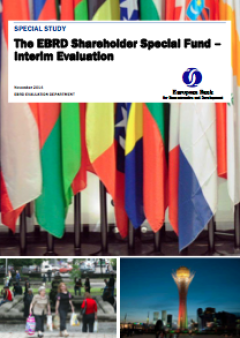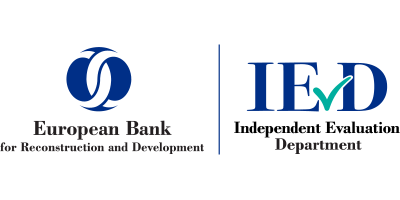
The EBRD Shareholder Special Fund – Interim Evaluation
Intended to focus on technical assistance and other initiatives such as investment grants, the SSF would complement donor funding, drawing its resources from allocations of EBRD net income. Now in its seventh year it has received a total of € 385 million and committed over € 250 million. The SSF has come to play a major role in supporting Bank initiatives and affects a wide cross section of Bank operational activities. SSF operations and issues have also been an area of very substantial Board engagement, interest and concern.
Prepared at Management's request, the evaluation assesses specific issues of SSF operations and management upstream of important Management and Board strategic and operational planning work, including with respect to grants and donor support. The following key merits of the SSF have been identified:
- The SSF has operated in a changing context for the entire EBRD donor co-financing structure, characterised by a desire for more strategic and streamlined use of resources and an array of strategic initiatives. In that setting, the SSF has played a key role in the Bank's partnership with donors, including with respect to structural changes, and it has contributed to substantial changes in the planning and reporting processes for grants.
- The SSF has also brought considerable value added by providing untied resources, acting as a fund of last resort, supporting strategic initiatives, and serving as a co-financing and bridge funding tool.
- The SSF has been managed efficiently given the limited human resources and inadequate technical resources available for grants management in EBRD.
- SSF governance has been fully integrated into existing EBRD mechanisms for grants planning and approvals; all stakeholders are complying with rules and roles.
The evaluation draws specific attention to important SSF operational, planning and governance issues flowing in large measure from divergent views on its intended priorities and how best to operationalise them. The SSF's unambiguously stated prime purpose is to "broaden and deepen the Bank's transition impact,” using its incremental funds to complement those of other donors. This has been interpreted by Management largely as filling funding gaps for ongoing operational activities, the transition merits of those activities having already been determined. Many on the shareholder side, however, see the SSF's founding proposition as providing high-value incremental resources specifically to make a distinctive and strategically prioritised transition contribution. This tension or duality – between selective use as an extender of the Bank's transition impact versus general use as a source of incremental funding – is well known but has never been clearly addressed and resolved. It has in turn powerfully shaped the Fund's practices and operations, and the concerns that exist between Shareholders and Management on SSF issues.

